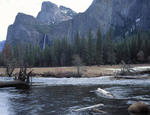The Pacific's wayward child
Jul 28th 2014, 11:31 by NV | LOS ANGELES
... Jay Lund, director of the Centre for Watershed Sciences, has simulated the effects of a 72-year drought, with rivers and streams flowing at 50% their average rates. The model built by Dr Lund and his colleagues at the University of California, Davis, sought to show whether, under such dire circumstances, California's water management system could continue to supply enough for people to drink, grow crops and still provide a habitat for fish and other wildlife.
As expected, the simulated drought proved catastrophic for some ecosystems and farming communities, with the greatest impact being felt in the agricultural heartland of the Central Valley. But the researchers were surprised by how little damage the simulated mega-drought did to the economy. The overall cost to the state was a few billion dollars a year. In hindsight, it is not difficult to see why. Despite California being the world’s fifth-largest supplier of food and agricultural commodities, farming accounts for little more than 2% of the state’s $2 trillion economy.
Therein lies the source of California’s woes. Agriculture uses 80% of the available water supply. Crops such as cotton, alfalfa and rice have no place in a semi-arid region relying extensively on irrigation. Almond and pistachio trees need year-round watering and take ages to mature.
http://www.economist.com/blogs/babbage/2014/07/difference-engine-2?fsrc=scn/tw/te/bl/ed/pacificswaywardchild
Home
>
General Discussion
>
Topic
Re: Surviving an extended drought in California
All posts are those of the individual authors and the owner
of this site does not endorse them. Content should be considered opinion
and not fact until verified independently.
|
Surviving an extended drought in California July 28, 2014 06:16PM | Registered: 15 years ago Posts: 543 |
|
Re: Surviving an extended drought in California July 28, 2014 08:20PM | Registered: 11 years ago Posts: 133 |
|
Re: Surviving an extended drought in California July 28, 2014 10:02PM | Registered: 11 years ago Posts: 133 |
Here's an interesting exercise: Calculate what percentage of your own city's water consumption falls in the form of rain in an average year?
You need to know
current consumption, in acre-feet.
area of land in acres.
yearly rainfall.
12 inches of rain produces 1 acre-foot upon an acre of land.
for example,
Fresno. It has 112 Sq Mi. = 640ac X 112= 71,680 ac
Average rainfall= 11.5 inches
So average rain is about 70,000 acre-feet a year (rounded)
HARD TO FIND USAGE DATA! From the city water site, I get about 140 million gallons a day. About 430 acre-feet/day.
So the rain falling is about 45 % of the city's needs. not captured.
In contrast, the tone of this article seems very wrong-headed to me. Of course, I don't like drinking uranium.
http://www.fresnobee.com/2014/04/26/3897507/fresno-water-supply-holds-up-vs.html
You need to know
current consumption, in acre-feet.
area of land in acres.
yearly rainfall.
12 inches of rain produces 1 acre-foot upon an acre of land.
for example,
Fresno. It has 112 Sq Mi. = 640ac X 112= 71,680 ac
Average rainfall= 11.5 inches
So average rain is about 70,000 acre-feet a year (rounded)
HARD TO FIND USAGE DATA! From the city water site, I get about 140 million gallons a day. About 430 acre-feet/day.
So the rain falling is about 45 % of the city's needs. not captured.
In contrast, the tone of this article seems very wrong-headed to me. Of course, I don't like drinking uranium.
http://www.fresnobee.com/2014/04/26/3897507/fresno-water-supply-holds-up-vs.html
|
Re: Surviving an extended drought in California July 28, 2014 10:49PM | Registered: 15 years ago Posts: 141 |
I find myself impressed with the data and conclusions, but I imagine a lot of the alfalfa crop goes to dairy cattle to provide milk for adjacent large California population centers. At least that was true when I lived in California some 40 years ago. I also had a lady History professor in the late 60s who said that southern California was ultimately going to have to desalinate ocean water. I'm glad that I live in the Yellowstone River drainage instead of the Colorado; I imagine future water litigation is going to get interesting.
|
Re: Surviving an extended drought in California July 29, 2014 11:49AM | Registered: 11 years ago Posts: 133 |
|
Re: Surviving an extended drought in California July 29, 2014 11:52AM | Registered: 11 years ago Posts: 133 |
Oh, and a little follow up to Fresno, which only recently started metering.
Their per capita consumption is well over 200 gallons a day, and there is huge controversy over moving it down to the range of 200.
Los Angeles per capita is 87 gal/day.
If they reduced their use to that level, it could ALL be provided by capturing rainwater.
Their per capita consumption is well over 200 gallons a day, and there is huge controversy over moving it down to the range of 200.
Los Angeles per capita is 87 gal/day.
If they reduced their use to that level, it could ALL be provided by capturing rainwater.
Sorry, only registered users may post in this forum.


